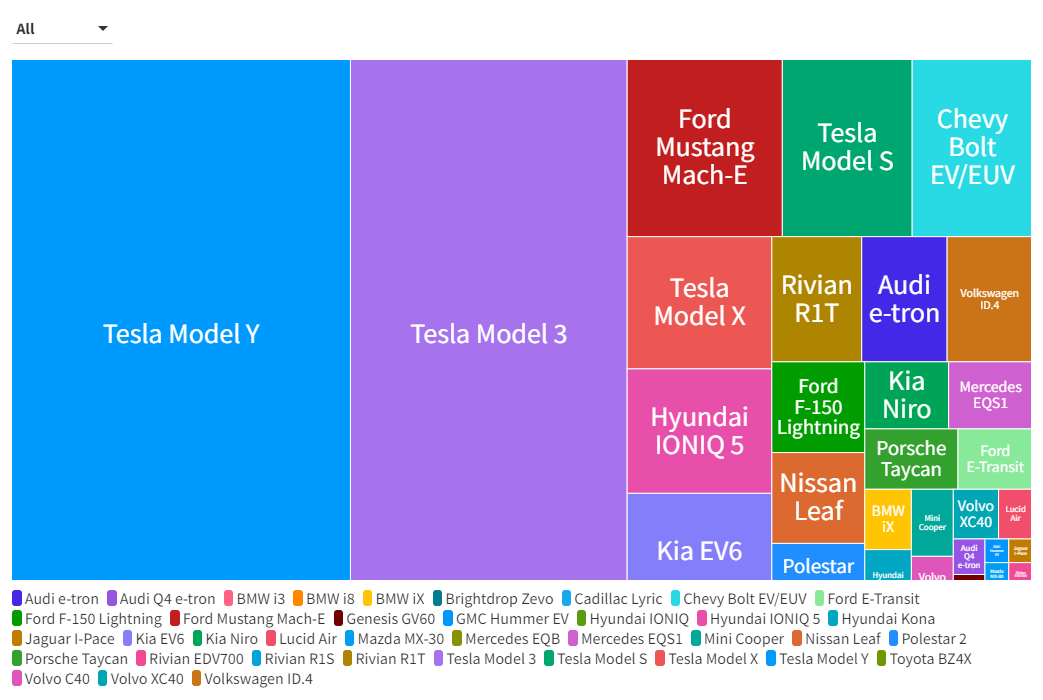https://tridenstechnology.com/electric-car-sales-statistics/
Wuling Hongguang Mini EV - Wikipedia (#2 best selling EV after Tesla Model 3, $5K)
Q3-2022-Kelley-Blue-Book-Electrified-Vehicle-Sales-Report.pdf
US electric vehicle sales by maker and EV model through Q3 2022 @electrek

| Model | 2022_Q3 | 2021_Q3 | YOY_Q3 | 2022 | 2021 | YOY | Q2 | YTD |
| Total EV & FCEV (Estima | 205,854 | 123,514 | 67% | 578,402 | 342,318 | 69.00% | ||
| Total (Estimates) | 205,682 | 122,744 | 68% | 576,408 | 339,671 | 69.70% | 100% | 100% |
| Tesla Model Y | 60,271 | 50,430 | 20% | 191,451 | 127,007 | 50.70% | 29.30% | 33.20% |
| Tesla Model 3 | 55,030 | 33,008 | 67% | 156,357 | 80,388 | 94.50% | 26.80% | 27.10% |
| Ford Mustang Mach-E | 10,414 | 5,880 | - | 28,089 | 18,855 | 49.00% | 5.10% | 4.90% |
| Tesla Model S | 9,171 | 3,668 | 150% | 23,464 | 13,043 | 79.90% | 4.50% | 4.10% |
| Chevy Bolt EV/EUV | 14,709 | 4,515 | 226% | 22,012 | 24,803 | -11.30% | 7.20% | 3.80% |
| Tesla Model X | 6,552 | 4,585 | 43% | 19,542 | 16,783 | 16.40% | 3.20% | 3.40% |
| Hyundai Ioniq5 | 4,800 | - | - | 18,492 | - | - | 2.30% | 3.20% |
| Kia EV6 | 4,996 | - | - | 17,564 | - | - | 2.40% | 3.00% |
| Rivian R1T | 5,991 | - | - | 11,581 | - | - | 2.90% | 2.00% |
| VW ID.4 | 6,657 | 6,049 | 10% | 11,072 | 12,279 | -9.80% | 3.20% | 1.90% |
| Audi e-tron | 2,799 | 909 | 208% | 10,828 | 7,793 | 38.90% | 1.40% | 1.90% |
| Nissan Leaf | 1,276 | 2,345 | -46% | 8,898 | 10,074 | -11.70% | 0.60% | 1.50% |
| Ford F-150 Lightning | 6,464 | - | - | 8,760 | - | - | 3.10% | 1.50% |
| Polestar 2 | 2,852 | 832 | - | 6,548 | 1,091 | 500.20% | 1.40% | 1.10% |
| Mercedes EQS1 | 1,978 | - | - | 6,028 | - | - | 1.00% | 1.00% |
| Porsche Taycan | 1,325 | 1,861 | -29% | 5,774 | 7,228 | -20.10% | 0.60% | 1.00% |
| Kia Niro | 533 | 3,310 | -84% | 5,688 | 5,716 | -0.50% | 0.30% | 1.00% |
| Ford E-Transit | 1,379 | - | - | 4,387 | - | - | 0.70% | 0.80% |
| BMW iX | 1,727 | - | - | 3,155 | - | - | 0.80% | 0.50% |
| Hyundai Kona | 903 | 2,038 | -56% | 2,800 | 5,439 | -48.50% | 0.40% | 0.50% |
| Mini Cooper | 1,099 | 488 | 125% | 2,615 | 1,226 | 113.30% | 0.50% | 0.50% |
| Volvo C40 | 339 | - | - | 2,138 | - | - | 0.20% | 0.40% |
| Volvo XC40 | 12 | 1,598 | -99% | 2,127 | 3,927 | -45.80% | 0.00% | 0.40% |
| Lucid Air | 654 | - | - | 1,596 | - | - | 0.30% | 0.30% |
| Toyota Mirai | 79 | 671 | -88% | 1,437 | 2,268 | -36.60% | ||
| Audi Q4 e-tron | 1,112 | - | - | 1,112 | - | - | 0.50% | 0.20% |
| Genesis GV60 | 807 | - | - | 1,040 | - | - | 0.40% | 0.20% |
| GMC Hummer | 411 | - | - | 782 | - | - | 0.20% | 0.10% |
| Mercedes EQB | 739 | - | - | 739 | - | - | 0.40% | 0.10% |
| Rivian R1S | 263 | - | - | 354 | - | - | 0.10% | 0.10% |
| Rivian EDV700 | 346 | - | - | 346 | - | - | 0.20% | 0.10% |
| Hyundia Nexo | 74 | 62 | 19% | 345 | 196 | 76.00% | ||
| Mazda MX-30 | 8 | - | - | 324 | - | - | 0.00% | 0.10% |
| Jaguar I-Pace | 22 | 229 | -90% | 290 | 884 | -67.20% | 0.00% | 0.10% |
| Toyota BZ4X | - | - | - | 232 | - | - | 0.00% | 0.00% |
| Honda Clarity | 19 | 37 | -49% | 212 | 183 | 15.80% | ||
| Brightdrop Zevo 600 / 4 | - | - | - | 155 | - | - | 0.00% | 0.00% |
| Cadillac Lyric | 36 | - | - | 36 | - | - | 0.00% | 0.00% |
| Hyundai Ioniq | 7 | 573 | -99% | 18 | 1,848 | -99.00% | 0.00% | 0.00% |
| BMW i3 | - | 426 | -100% | 9 | 1,277 | -99.30% | 0.00% | 0.00% |
| BMW i8 | - | - | 5 | 10 | -50.00% | 0.00% | 0.00% |